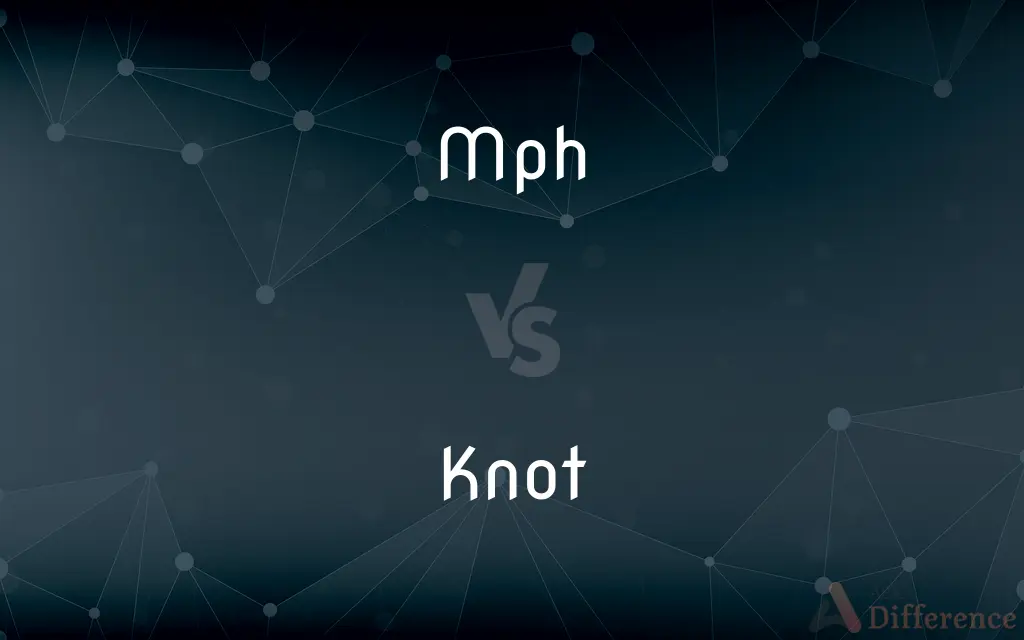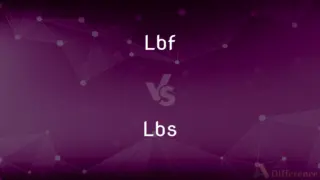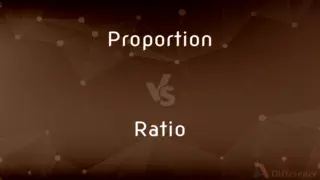MPH vs. Knot — What's the Difference?
Edited by Tayyaba Rehman — By Fiza Rafique — Updated on March 20, 2024
MPH (Miles Per Hour) is a unit of speed representing miles covered in one hour, commonly used in the US and UK, while knots measure maritime and aerial speeds, equal to one nautical mile per hour.

Difference Between MPH and Knot
Table of Contents
ADVERTISEMENT
Key Differences
MPH, or miles per hour, is a unit of speed commonly used in the United States and the United Kingdom to measure the speed of vehicles on land. It quantifies how many miles a vehicle can travel in an hour. Whereas knots are a unit of speed used primarily in maritime and aviation contexts, representing one nautical mile per hour. This measurement is crucial for navigating and charting courses at sea or in the air.
MPH is based on the imperial system of measurement, which aligns with other units like feet and yards used in these countries for various measurements. This makes it a familiar and standardized way to express vehicle speeds on roads. On the other hand, knots are part of the nautical measurement system, which is internationally recognized for its use in navigation. This system considers the Earth's circumference and offers a direct relation to geographical miles.
MPH is typically used in weather reports, automotive speeds, and road signs in countries that utilize the imperial system. This ensures that residents and drivers in these areas receive information in a familiar format. Conversely, knots are used globally in maritime and aeronautical communications, ensuring a standardized speed measurement that aids in the safety and efficiency of international travel by sea and air.
The conversion between MPH and knots is important in various contexts, especially when translating speeds from land-based measurements to those applicable in maritime and aerial navigation. While one MPH is equal to approximately 0.869 knots, understanding this conversion can be crucial for accurate and safe navigation practices.
Despite MPH being widely used in certain countries, the global importance of knots in international navigation highlights the necessity of understanding both units. Knots, with their unique relevance to the geographical measurement of the Earth, provide a critical tool for pilots and sailors in their navigational calculations.
ADVERTISEMENT
Comparison Chart
Definition
Unit of speed equal to one mile per hour.
Unit of speed equal to one nautical mile per hour.
Usage
Predominantly in the US and UK for land travel.
Primarily in maritime and aviation globally.
Measurement System
Imperial
Nautical
Conversion
1 MPH = 0.869 knots
1 Knot = 1.15078 MPH
Context
Weather reports, automotive, road signs.
Navigation, maritime, and aeronautical communications.
Compare with Definitions
Mph
Commonly used in countries like the US and UK for road speeds.
Road signs in the US display speed limits in MPH.
Knot
Essential for pilots and sailors for accurate navigation.
Flight plans are calculated in knots to ensure precise timings.
Mph
Used to describe wind speeds in certain countries.
The hurricane is moving at 80 MPH towards the coast.
Knot
Used globally to describe wind speeds and storm movements at sea.
The tropical storm is advancing at 40 knots.
Mph
A standard measure for vehicle performance tests.
The sports car can accelerate from 0 to 60 MPH in just 3.5 seconds.
Knot
Knots can be converted into MPH or KPH for general understanding.
20 knots is approximately 23 MPH.
Mph
A measure of speed indicating the distance in miles traveled per hour.
The car was speeding at 70 MPH on the highway.
Knot
A universal unit for maritime and aerial speed measurements.
Nautical charts and aviation manuals specify speeds in knots.
Mph
Can be converted to kilometers per hour (KPH) or knots for international contexts.
55 MPH is approximately 88.51 KPH.
Knot
A unit of speed used in navigation that equals one nautical mile per hour.
The ship was cruising at 15 knots towards the harbor.
Mph
The ratio of the distance traveled (in miles) to the time spent traveling (in hours)
Knot
A knot is an intentional complication in cordage which may be practical or decorative, or both. Practical knots are classified by function, including hitches, bends, loop knots, and splices: a hitch fastens a rope to another object; a bend fastens two ends of a rope to each another; a loop knot is any knot creating a loop; and splice denotes any multi-strand knot, including bends and loops.
Mph
A speedometer reading for the momentary rate of travel
Knot
A fastening made by looping a piece of string, rope, or something similar on itself and tightening it
A complicated knot of racial politics and pride
Tie a knot at the end of the cord
Knot
A tangled mass in something such as hair or wool.
Knot
A knob, protuberance, or node in a stem, branch, or root.
Knot
An unpleasant feeling of tightness or tension in a part of the body
Her stomach was in knots as she unlocked the door
Knot
A small tightly packed group of people
A knot of spectators was gathering
Knot
A unit of speed equivalent to one nautical mile per hour, used especially of ships, aircraft, or winds.
Knot
A small, relatively short-billed sandpiper, with a reddish-brown or blackish breast in the breeding season.
Knot
Fasten with a knot
A knotted rope
The scarves were knotted loosely around their throats
Knot
Make (something, especially hair) tangled
The shampoo knotted my hair terribly
Knot
Cause (a muscle) to become tense and hard.
Knot
A compact intersection of interlaced material, such as cord, ribbon, or rope.
Knot
A fastening made by tying together lengths of material, such as rope, in a prescribed way.
Knot
A decorative bow of ribbon, fabric, or braid.
Knot
A unifying bond, especially a marriage bond.
Knot
A tight cluster of persons or things:a knot of onlookers.
Knot
A feeling of tightness:a knot of fear in my stomach.
Knot
A complex problem.
Knot
A hard place or lump, especially on a tree, at a point from which a stem or branch grows.
Knot
The round, often darker cross section of such a lump as it appears on a piece of cut lumber.Also called node.
Knot
A protuberant growth or swelling in a tissue:a knot in a gland.
Knot
(Nautical)A division on a log line used to measure the speed of a ship.
Knot
Abbr. kn. or kt.A unit of speed, one nautical mile per hour, approximately 1.85 kilometers (1.15 statute miles) per hour.
Knot
A distance of one nautical mile.
Knot
(Mathematics)A closed loop that is embedded in three-dimensional space and that can be intertwined with or tangled in itself, but that cannot intersect itself.
Knot
Either of two migratory sandpipers of the genus Calidris that breed in Arctic regions, especially the red knot.
Knot
To tie in or fasten with a knot or knots.
Knot
To snarl or entangle.
Knot
To cause to form a knot or knots.
Knot
To form a knot or knots.
Knot
To become snarled or entangled.
Knot
A looping of a piece of string or of any other long, flexible material that cannot be untangled without passing one or both ends of the material through its loops.
Climbers must make sure that all knots are both secure and of types that will not weaken the rope.
Knot
A tangled clump.
The nurse was brushing knots from the protesting child's hair.
Knot
A maze-like pattern.
Knot
(mathematics) A non-self-intersecting closed curve in (e.g., three-dimensional) space that is an abstraction of a knot (in sense 1 above). Category:en:Curves
A knot can be defined as a non-self-intersecting broken line whose endpoints coincide: when such a knot is constrained to lie in a plane, then it is simply a polygon.
Knot
A difficult situation.
I got into a knot when I inadvertently insulted a policeman.
Knot
The whorl left in lumber by the base of a branch growing out of the tree's trunk.
When preparing to tell stories at a campfire, I like to set aside a pile of pine logs with lots of knots, since they burn brighter and make dramatic pops and cracks.
Knot
Local swelling in a tissue area, especially skin, often due to injury.
Jeremy had a knot on his head where he had bumped it on the bedframe.
Knot
A tightened and contracted part of a muscle that feels like a hard lump under the skin.
Knot
A protuberant joint in a plant.
Knot
Any knob, lump, swelling, or protuberance.
Knot
The swelling of the bulbus glandis in members of the dog family, Canidae.
Knot
The point on which the action of a story depends; the gist of a matter.
The knot of the tale
Knot
(engineering) A node.
Knot
A kind of epaulet; a shoulder knot.
Knot
A group of people or things.
Knot
A bond of union; a connection; a tie.
Knot
A unit of speed, equal to one nautical mile per hour. (From the practice of counting the number of knots in the log-line (as it is paid out) in a standard time. Traditionally spaced at one every 120 of a mile.)
Cedric claimed his old yacht could make 12 knots.
Knot
(aviation) A unit of indicated airspeed, calibrated airspeed, or equivalent airspeed, which varies in its relation to the unit of speed so as to compensate for the effects of different ambient atmospheric conditions on aircraft performance.
In the early stages of reentry, due to the extremely-rarefied air at these altitudes, the space shuttle flew at only one to a few knots equivalent airspeed, even when its actual speed was many thousands of knots.
Knot
(nautical) A nautical mile.
Knot
(slang) The bulbus glandis.
Knot
(fandom) In omegaverse fiction, a bulbus glandis-like structure on the penis of a male alpha, which ties him to an omega during intercourse.
Knot
One of a variety of shore birds; red-breasted sandpiper (variously Calidris canutus or Tringa canutus).
Knot
(transitive) To form into a knot; to tie with a knot or knots.
We knotted the ends of the rope to keep it from unravelling.
Knot
(transitive) To form wrinkles in the forehead, as a sign of concentration, concern, surprise, etc.
She knotted her brow in concentration while attempting to unravel the tangled strands.
Knot
To unite closely; to knit together.
Knot
To entangle or perplex; to puzzle.
Knot
(intransitive) To form knots.
Knot
(intransitive) To knit knots for a fringe.
Knot
A fastening together of the parts or ends of one or more threads, cords, ropes, etc., by any one of various ways of tying or entangling.
Knot
A bond of union; a connection; a tie.
Ere we knit the knot that can never be loosed.
Knot
Something not easily solved; an intricacy; a difficulty; a perplexity; a problem.
Knots worthy of solution.
A man shall be perplexed with knots, and problems of business, and contrary affairs.
Knot
A figure the lines of which are interlaced or intricately interwoven, as in embroidery, gardening, etc.
Flowers worthy of paradise, which, not nice artIn beds and curious knots, but nature boonPoured forth profuse on hill, and dale, and plain.
Knot
A cluster of persons or things; a collection; a group; a hand; a clique; as, a knot of politicians.
His ancient knot of dangerous adversaries.
Palms in cluster, knots of Paradise.
As they sat together in small, separate knots, they discussed doctrinal and metaphysical points of belief.
Knot
A portion of a branch of a tree that forms a mass of woody fiber running at an angle with the grain of the main stock and making a hard place in the timber. A loose knot is generally the remains of a dead branch of a tree covered by later woody growth.
Knot
A knob, lump, swelling, or protuberance.
With lips serenely placid, felt the knotClimb in her throat.
Knot
A protuberant joint in a plant.
Knot
The point on which the action of a story depends; the gist of a matter.
I shoulde to the knotte condescend,And maken of her walking soon an end.
Knot
See Node.
Knot
A division of the log line, serving to measure the rate of the vessel's motion. Each knot on the line bears the same proportion to a mile that thirty seconds do to an hour. The number of knots which run off from the reel in half a minute, therefore, shows the number of miles the vessel sails in an hour.
Knot
A kind of epaulet. See Shoulder knot.
Knot
A sandpiper (Tringa canutus), found in the northern parts of all the continents, in summer. It is grayish or ashy above, with the rump and upper tail coverts white, barred with dusky. The lower parts are pale brown, with the flanks and under tail coverts white. When fat it is prized by epicures. Called also dunne.
The knot that called was Canutus' bird of old,Of that great king of Danes his name that still doth hold,His appetite to please that far and near was sought.
Knot
To tie in or with, or form into, a knot or knots; to form a knot on, as a rope; to entangle.
As tight as I could knot the noose.
Knot
To unite closely; to knit together.
Knot
To entangle or perplex; to puzzle.
Knot
To form knots or joints, as in a cord, a plant, etc.; to become entangled.
Cut hay when it begins to knot.
Knot
To knit knots for fringe or trimming.
Knot
To copulate; - said of toads.
Knot
A tight cluster of people or things;
A small knot of women listened to his sermon
Knot
Any of various fastenings formed by looping and tying a rope (or cord) upon itself or to another rope or to another object
Knot
A hard cross-grained round piece of wood in a board where a branch emerged;
The saw buckled when it hit a knot
Knot
Something twisted and tight and swollen;
Their muscles stood out in knots
The old man's fists were two great gnarls
His stomach was in knots
Knot
A unit of length used in navigation; equivalent to the distance spanned by one minute of arc in latitude; 1,852 meters
Knot
Soft lump or unevenness in a yarn; either an imperfection or created by design
Knot
A sandpiper that breeds in the arctic and winters in the southern hemisphere
Knot
Make into knots; make knots out of;
She knotted der fingers
Knot
Tie or fasten into a knot;
Knot the shoelaces
Knot
Tangle or complicate;
A ravelled story
Common Curiosities
Are MPH and knots interchangeable?
They measure speed differently and are preferred in their specific contexts.
Can knots be used for land speeds?
While possible, knots are primarily used for maritime and aviation speeds.
Why are knots important in navigation?
Knots provide a standardized speed measurement crucial for safe maritime and aerial navigation.
How do you convert MPH to knots?
Multiply the speed in MPH by 0.869 to get the speed in knots.
What is the difference between a knot and a nautical mile?
A knot is a speed measure equal to one nautical mile per hour, while a nautical mile is a distance measure.
Why are knots preferred over KPH in navigation?
Knots directly relate to the geographical dimensions of Earth, which is crucial for navigation.
How is wind speed measured in aviation?
In aviation, wind speed is typically measured in knots.
Is MPH used worldwide?
MPH is mainly used in countries that follow the imperial system, like the US and UK.
What is the significance of the nautical measurement system?
It's essential for accurate maritime and aerial navigation, relating directly to the Earth's geography.
Why do some countries use MPH instead of KPH?
It's due to their adherence to the imperial system of measurement.
What is MPH used for?
MPH is used for measuring speed on land, particularly in the US and UK.
Can the use of knots affect flight planning?
Yes, accurate speed measurement in knots is crucial for effective flight planning and safety.
What happens if you mistakenly use MPH for maritime speed?
It can lead to inaccuracies in navigation and distance calculations.
Do all vehicles measure speed in MPH?
No, vehicles in many countries use kilometers per hour (KPH).
How has the use of MPH and knots evolved?
While the use of MPH has remained stable in specific countries, knots have continued to be the standard for global navigation in maritime and aviation fields.
Share Your Discovery

Previous Comparison
Lbf vs. Lbs
Next Comparison
Proportion vs. RatioAuthor Spotlight
Written by
Fiza RafiqueFiza Rafique is a skilled content writer at AskDifference.com, where she meticulously refines and enhances written pieces. Drawing from her vast editorial expertise, Fiza ensures clarity, accuracy, and precision in every article. Passionate about language, she continually seeks to elevate the quality of content for readers worldwide.
Edited by
Tayyaba RehmanTayyaba Rehman is a distinguished writer, currently serving as a primary contributor to askdifference.com. As a researcher in semantics and etymology, Tayyaba's passion for the complexity of languages and their distinctions has found a perfect home on the platform. Tayyaba delves into the intricacies of language, distinguishing between commonly confused words and phrases, thereby providing clarity for readers worldwide.
















































